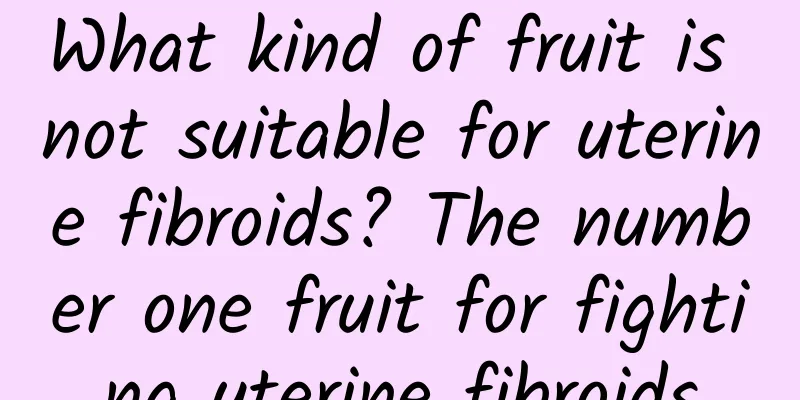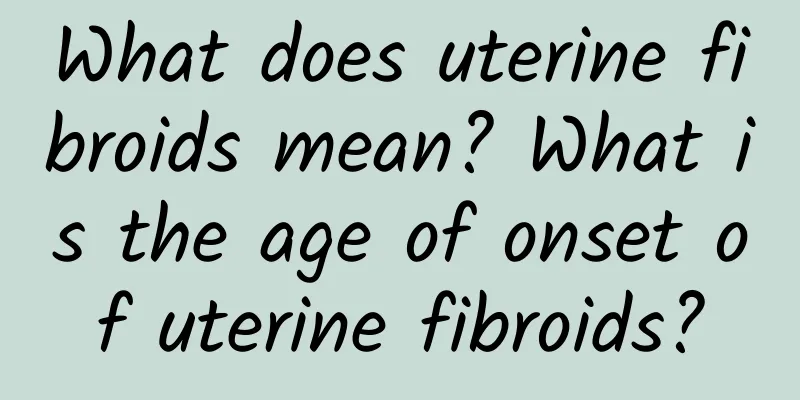What kind of fruit is not suitable for uterine fibroids? The number one fruit for fighting uterine fibroids

|
What kind of fruit is not suitable for uterine fibroids? The number one fruit for fighting uterine fibroids Uterine fibroids are a common benign tumor in women. Their occurrence is mainly related to endocrine disorders and genetic factors. In daily life, we can regulate the body's endocrine system through diet, thereby slowing down the development of uterine fibroids. However, some fruits are not suitable for patients with uterine fibroids due to their unique ingredients and effects. Pineapple is an acidic fruit, but it contains an enzyme called protease, which is not conducive to the growth of uterine smooth muscle for patients with uterine fibroids. This is because protease can promote the proliferation of uterine smooth muscle cells, thereby aggravating the symptoms and expansion of uterine fibroids, so patients with uterine fibroids should avoid eating pineapple. Grapefruit is one of the fruits that many people like, but patients with uterine fibroids should stay away from grapefruit. The naringin contained in grapefruit can inhibit the production of certain hormones, thereby interfering with the hormone balance in the body and aggravating the symptoms of uterine fibroids. The citric acid in grapefruit can also stimulate the contraction of uterine smooth muscle, further aggravating the pain of uterine fibroids. Therefore, patients with uterine fibroids are advised to eat less or no grapefruit. Oranges are a popular fruit, but they are not suitable for patients with uterine fibroids. Oranges are rich in vitamin C, especially in the peel and white pulp. Although vitamin C has an antioxidant effect, excessive intake can cause the growth and division of uterine smooth muscle fibroblasts, thereby aggravating the condition of uterine fibroids. Therefore, patients with uterine fibroids should limit their intake of oranges. Uterine fibroids are a common benign tumor in women. Although they will not turn into malignant tumors, they can cause discomfort and pain to patients. Diet plays an important role in the treatment and management of uterine fibroids. In addition to avoiding some unsuitable fruits, patients with uterine fibroids should also pay attention to a balanced diet and consume fiber-rich foods such as whole grains, vegetables and fruits. Eating more foods rich in vitamins B and E, maintaining a good weight and exercising moderately are also helpful in the management of uterine fibroids. Most importantly, patients with uterine fibroids should actively cooperate with the doctor's treatment and have regular physical examinations to understand changes in the condition and adjust their diet and treatment plans in a timely manner. Pineapple, grapefruit and orange are fruits that patients with uterine fibroids should not eat too much. Proper dietary conditioning can help slow the development of uterine fibroids, but different people may react differently to fruits. Therefore, when choosing fruits, you should adjust your diet according to your personal situation and the doctor's advice. At the same time, we should also attach importance to a scientific and healthy lifestyle, maintain a good attitude and get enough rest to keep the body healthy and balanced. |
Recommend
Does the removal of the left ovarian cyst affect pregnancy? What are the main symptoms?
Left ovarian cyst is a common benign tumor of the...
How can we prevent chronic adnexitis
Recently, due to the placement of intrauterine co...
How to treat anovulatory amenorrhea
Treatment of anovulatory amenorrhea requires medi...
Main nursing measures for adnexitis
Adnexitis is a common inflammation in many women....
How to take care of patients with pelvic inflammatory disease in daily life
Pelvic inflammatory disease is a common gynecolog...
What should pregnant women with cervical precancerous lesions supplement?
What should pregnant women with cervical precance...
What are the dietary precautions after miscarriage?
Nowadays, young people have more open minds, the ...
Dietary principles for menopause
During menopause, you need to pay attention to so...
What are the causes of dysmenorrhea?
Dysmenorrhea can be caused by colds, psychologica...
Don’t dare to eat after exercise, fearing that it will be in vain and difficult to maintain your body shape? Eat enough nutrition to maintain your body shape and sustain your energy
In recent years, sports have become increasingly ...
Can men take Wuji Baifeng Pills? Treat prostate hyperplasia
Although Wuji Baifeng Pills is used to treat mens...
Daily care for patients with Bartholinitis
Experts say that among the pathogens of Bartholin...
How much does it cost to treat Bartholinitis?
We usually cannot feel Bartholinitis, and it can ...
What are the specific symptoms of early ovarian cysts?
What are the early symptoms of ovarian cysts? Ova...
Bloggers love eating this way! Recipe for thin face (Part 2)
Ai Ai Wo, who is not fat, once tried the legendar...









